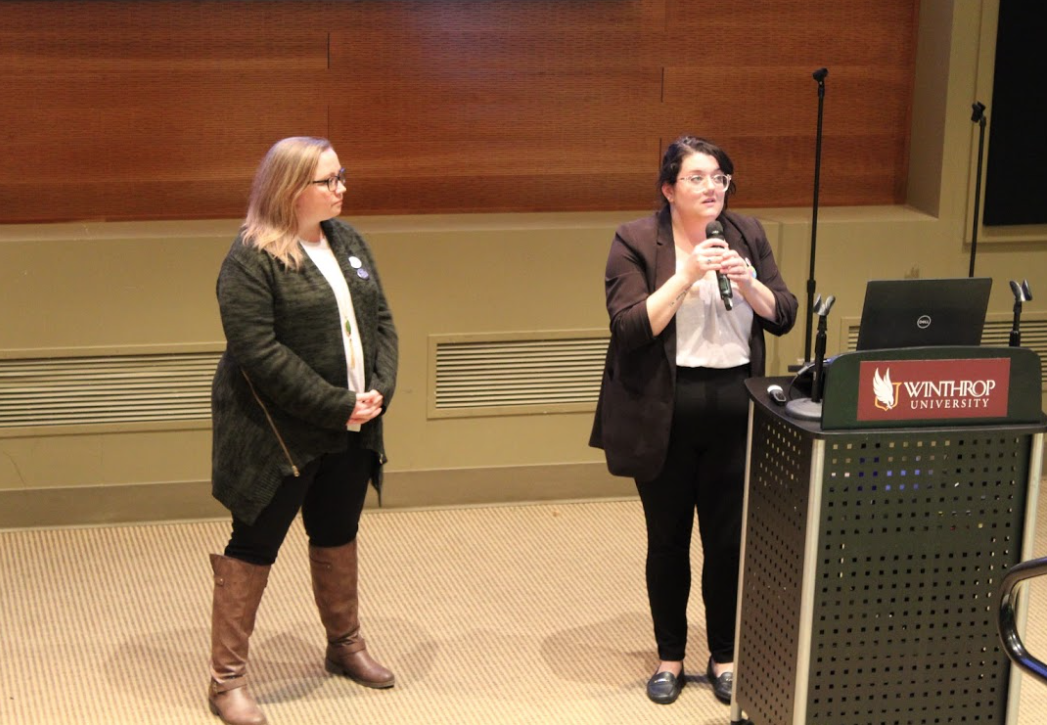On Tues. Jan. 22, Winthrop’s Planned Parenthood Club invited Calla Hales, an administrator for A Preferred Women’s Health Center, and Ashley Skidmore, a member of the advocacy group Charlotte for Choice, to talk to students about the stigmatization surrounding abortion.
There are around 56 million abortions that occur annually worldwide. Abortion is an elective termination procedure. There are two methods of inducing abortion: surgically or with a pill.
“There’s a surgical method. It’s a five to ten minute procedure through something called aspiration and evacuation. There’s also a pill method where you can pass the pregnancy at home, not unlike a miscarriage. That’s for ten weeks and less,” Hales said.
Abortion clinics like the one that Hales works for also offer miscarriage management.
“We have patients that come in for miscarriage management quite frequently because it’s much less expensive to go to an independent clinic than it is to go to a hospital or an ER for miscarriage management,” Hales said.
The 1973 Roe v. Wade decision ruled that abortion bans imposed by states were unconstitutional. In the United States, a woman can elect to have an abortion during the first trimester of her pregnancy. After 20 weeks, it goes to state rule.
“North Carolina and South Carolina both have a ban at 20 weeks. Up to 20 weeks, you can procure an abortion procedure,” Hales said.
In North and South Carolina, there is a mandatory counseling and waiting period that a woman must undergo before she can have an abortion. South Carolina’s waiting period is 24 hours, while North Carolina’s waiting period is 72 hours.
“This is something that a lot of states in the country are forcing, this kind of forced counseling. Honest answer: I don’t think it’s going to go away any time soon,” Hales said.
Hales said state-mandated counseling and a required waiting period can present problems for women trying to have an abortion.
“You’re making someone wait for a procedure they may not have time to wait for or the funds or the necessary resources to do so. You’re also reading them as state–mandated forms, meaning the information you’re giving may not be scientifically accurate,” Hales said.
Some of this misinformation includes the risk for breast cancer, sterility and the chance of depression increasing after an abortion. Hales said these claims are all false.
Sydney DeMichael, a junior psychology major, said resources such as counseling should be available but that a waiting period can negatively affect a woman.
“I agree with what they said. It kind of pushes back and it’s kind of time sensitive. I do think there should be resources like counseling, but maybe not with false information,” DeMichael said.
Abortion care is not available in many hospitals. UNC Chapel Hill is the only hospital in North Carolina that offers elective abortion procedures. The procedure is offered only one day a week and is open only to patients where a full-term pregnancy could be life threatening.
Hales said one of the reasons independent clinics are often the sole places to have an abortion procedure is due to the fact that many medical programs do not educate on abortion care for fear of losing state funding.
“Abortion care is not something that is considered common in any type of OB-GYN or medical school programs, which is incredibly sad because the amount of doctors who are trained to provide this care is dwindling. A lot of state programs have actually had to stop doing abortion training in their medical programs because of state funding and the threat that the state would take away their funding for teaching abortion care,” Hales said.
Ashley Skidmore is on the board for abortion advocacy group Charlotte For Choice. A large part of Skidmore’s role at clinics is involved with sidewalk protesters.
“I am a clinic defender. What that means is, I stand on the sidewalk and I essentially am directing traffic. All defenders, we’re holding clinic parking signs, and we’re getting [patients] into the parking lot; we’re engaging with protesters,” Skidmore said.
Protesters often picket around abortion clinics and try to interact with women entering the clinics. In order to help women feel more comfortable, there are clinic escorts who walk with women from their cars to the clinic.
“Our clinic escorts are part of the Charlotte for Choice program. They wear vests and what they do is, when a patient pulls in, they essentially give them all the time they need to get out of the car, smoke a cigarette, whatever they need to do and then they have umbrellas. Sometimes they have little bluetooth [speakers] with music playing to kind of drown out the sound and then they walk and shield them from the protesters that are on the sidewalk. They do not interact with protesters at all. Their sole focus is getting a patient from their car inside the clinic with as much peace of mind they can possibly have in that moment,” Skidmore said.
Elizebeth Jasewicz, a sophomore elementary education major, said she disagreed with protesting outside of clinics because they cannot be fully aware of the woman’s situation.
“Honestly, I thought the protesting was really mean because it is a woman’s choice. Especially because they don’t know exactly what the woman is going through at that time,” Jasewicz said.
Abortion is actually on the decline in the United States. According to Hales, the estimated number of abortions in the U.S. in 2018 was 900,000. In 2011, that number was 1.4 million.
“The reason this number keeps going down is not because abortion isn’t necessary. It’s because there’s better access to affordable contraception; there’s better access to comprehensive sex education,” Hales said.




